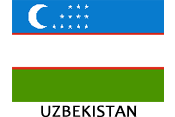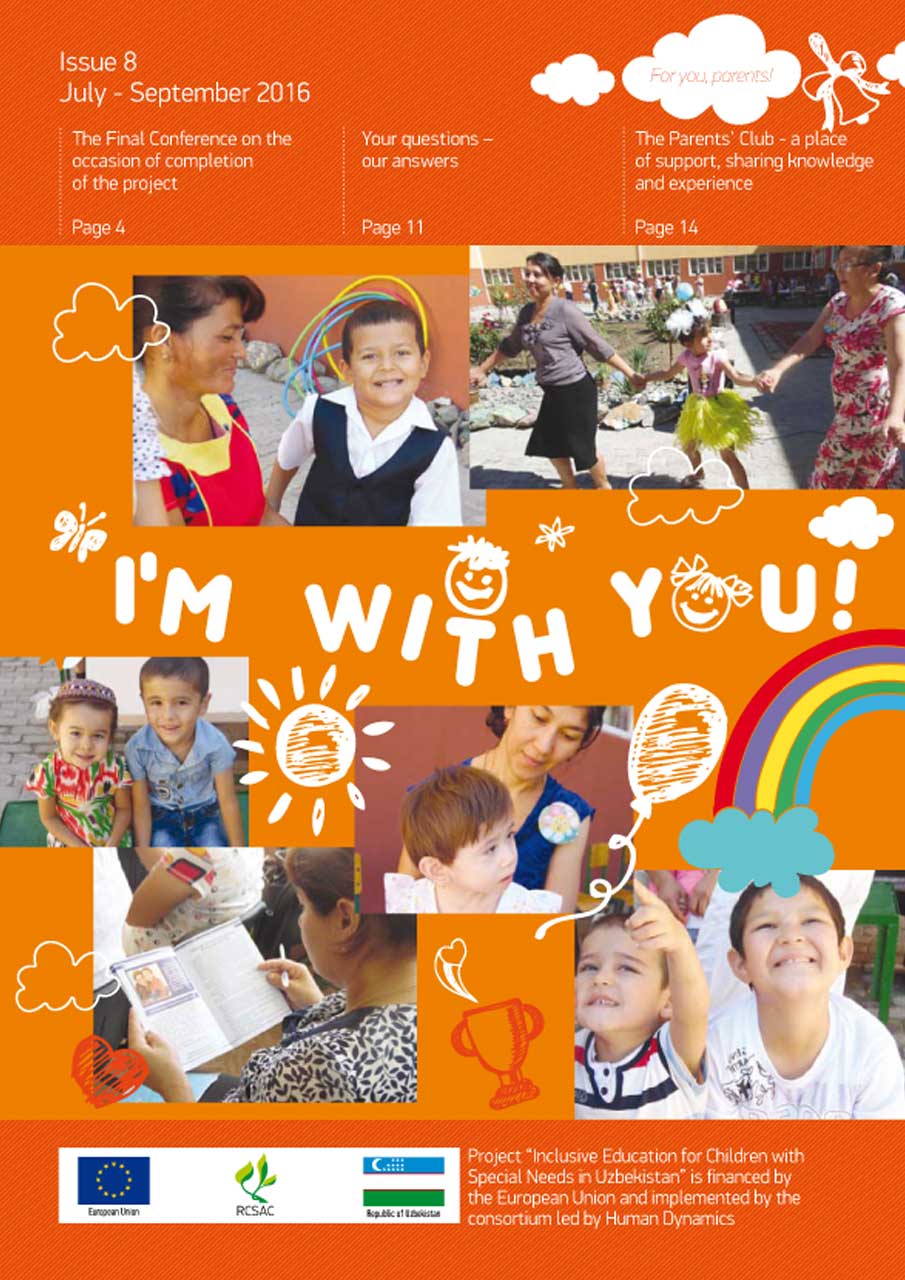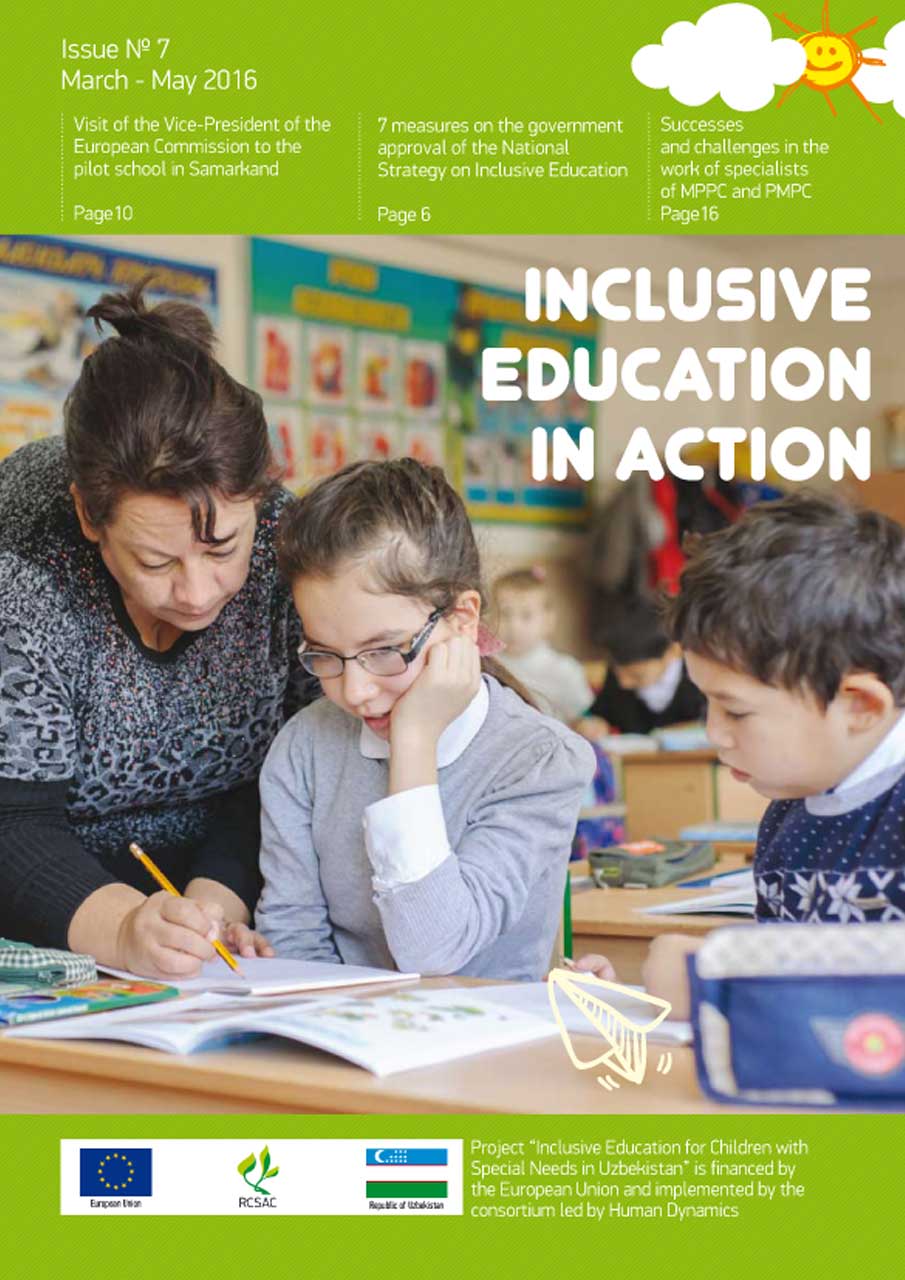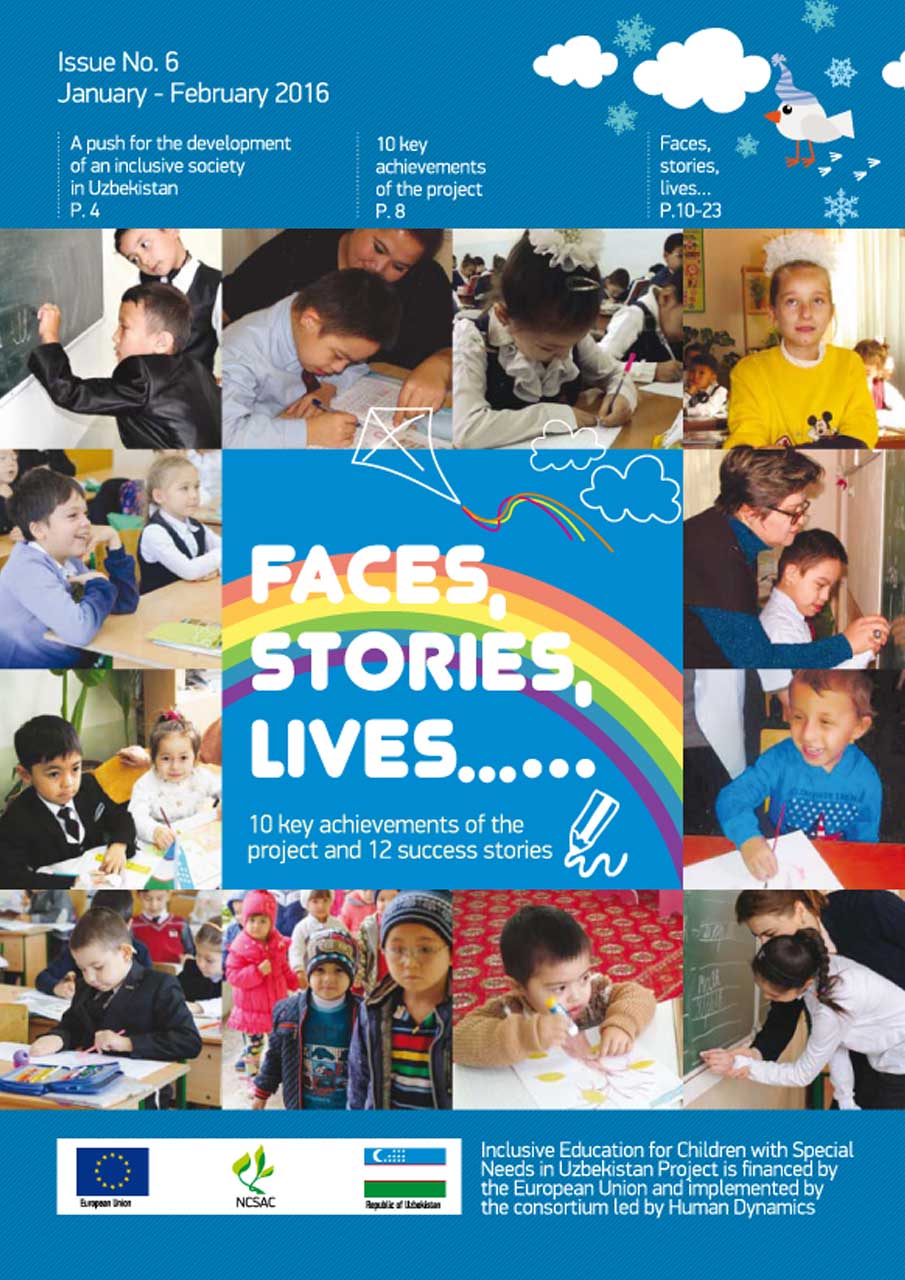Expert’s corner: Methodology of Inclusive Education
(Author: Muminova, Lola Rakhimovna, Expert on training modules and Medical-Pedagogic Commission, Deputy Director on Science of Republican Center of social adaptation of children.)
Current Methodology was prepared jointly with foreign expert Elena Vakhokopusv within the framework of the project “Inclusive education for children with special needs in Uzbekistan” financed by European Commission.
By supporting inclusive education the government of Uzbekistan acknowledges its adherence to the realization of common right for education for all and everyone. Inclusion of people with disabilities into the society is considered to be an important principle of recognition of the necessity to satisfy individual educational needs and equality of all children in order to guarantee that the capability of each student is realized.
This methodology is elaborated to provide mutual understanding and commitment to inclusive education of pre-school and elementary teachers as well as students of certain colleges and universities in order to facilitate capacity development.
The methodology provides the basis for teaching children with special educational needs (SPECIAL EDUCATIONAL NEEDS) in line with the UN Convention on the rights of people with disabilities, UN Convention on Children’s rights and in full accordance with national policy on education and social protection of children including in line with the National action plan within the framework of the Program “Education is for all”. The principles and approaches for actualization of introducing inclusive education into the education system, particularly, in elementary school and pre-school are described in the methodology. Methodology is the first part of the package of teaching methods. The package consists of the following parts:
- Methodology of inclusive education in elementary school and preschool.
- Teacher edition I for teachers in inclusive preschools and other preschools (children’s age is 2 to 7 years)
- Teacher edition II for teachers in elementary grades (children’s age is 7 to 10 years)
The aim of the Package of teaching methodic is the preparation and facilitation of teachers working in educational institutions or involved in capacity development as well as teachers working in inclusive preschools and schools so that they are able to concentrate on individual needs of every child and provide quality education for all children including children with special educational needs.
The Package also includes recommendations, such as how to attract children’s interest and keep their attention, how to assess children’s success in education. Both teacher editions include specific examples, short stories and practical recommendations.
The methodic helps teachers to work with individual needs and the strengths of all learners. Teachers and assisting personal can use these materials in inclusive classes and develop the quality of education of each child including children with various special educational needs (various groups of children with physical disabilities, children from ethnic minorities, refugees, children with emotional disorders, children previously uneducated, etc.)
The methodology was developed jointly with national and European experts by number of discussions, observations and analysis of national legislation and practices and implementing the best national, European and international practices and know-how in the field of inclusive education. The Package was discussed and approved by the main partners (RCSAC and MoPE) and with other concerned parties and was piloted in certain schools and resource centers (on selection in component 1), as well as workshops for teachers (trainings for trainers) from:
- Tashkent State University of Pedagogy named after Nizami
- Central Institution for professional and capacity development of public education personnel named after Avloni
- Republican Center for professional and capacity development of preschool personnel
1. Overview of inclusion
This part – introduction to theory and practice of inclusive education. The aim is to facilitate teachers and students to develop positive relationship to inclusive education, to understand what knowledge and skills needed in inclusive school and preschool, to get general idea of inclusive education practices and know how these practices can be organized.
2. The right for education is the main right of a human being
Each child has the main right for education and has to possess an opportunity to get and support reasonable level of knowledge1. Inclusive education is based on the standards and principles of human rights as stipulated in international agreements on human rights. Back in 1948 Common Declaration of Human rights preached for education rights for all without discrimination. The Convention of Children’s rights (1989) guarantees child’s right for education. Dakar World Declaration on education for all (2000) endorsed that the human right for education is the basis for providing education for all.
Uzbekistan ratified the Conventionon the rights of people with disabilities which requires the government to acknowledge the rights of people with special needs for education. In order to realize this right without discrimination and on the basis of equal opportunities the government must provide inclusive education in all levels. Full human capacity development is to be the priority as well as sense of dignity and self-respect to develop personality, talent and creative work of people with health disorders, and also develop their mental and physical capabilities in full potential. In order to make the rights for education reality, children with special needs of disability cause must not be excluded from the free and compulsory public education system or secondary education. They must possess access to inclusive, quality and free elementary and secondary education in their place of residence. For this to happen it is necessary to provide meaningful adjustments in schools taking into consideration individual needs and required support2.
This means that the education system must meet the standards of human rights both on content and process level. The committee on economic, social and cultural rights in its general order remark #13 on the rights of education describes state obligations on protection, respect and adherence of rights for education as the provision of attainability, accessibility, receptibility and adaptability of education.
3. What do we mean, when we talk about inclusion?
Inclusion – it is concurrently the result and process of developing conditions in which people take part in social life. This guarantees that children and adults have rights to vote in decision making in issues concerning their own life and they have equal access to all aspects of life of the society.
When we talk about education, inclusion is the efforts taken to provide an opportunity for children with disabilities to attend school with all other children and at the same time receive specially designed teaching and support that are necessary to achieve success as a learner. Inclusion means to adopt measures to remove barriers in education and social participation. Inclusion includes liquidation of discrimination and facilitation of equality.
UNESCO identifies inclusion as “the process of paying attention and making reaction to the variety of needs of all learners by means of increasing participation in learning, culture and societies, and decreasing exceptions in their education. It involves change and modification in the contents, approaches, structures and strategies with common vision, which covers children of related age category, and belief that existing system is responsible for the education of all children”.3
4. What is inclusive education?
Inclusive education means that all learners including learners with disabilities study in public schools in their place of residence and in their age group, in common classrooms and receive necessary support to study, bring their own contribution and participation in all aspects of school life. Inclusive education has positive upbringing and social impact to all learners – children with special needs as well as children without special needs.
Inclusive education also means that the program of preschools, schools are elaborated and projected in such a way that all children study together and together participate in all school and preschool events.
Inclusive education is linked with the principles of equality, social justice, democracy and participation. Decreasing academic failure and reducing unfairness has decisive meaning not only for economic development and competitiveness, but also for diminishing poverty and strengthening social integration4.
Inclusive education means that children with disabilities receive support in related age classes of public schools with proximity to their home and get specialized education in line with their individual program of study within the framework of main educational program and events in a class.
Inclusive education is to begin as early as possible: as soon as the special needs identified immediate measures of intervention must be taken in correction as well as in prevention of further development of disorders. Highly qualified teachers have decisive meaning with well established support systems and respective financial mechanisms.
5. What is the difference between inclusive and specialized institutions?
This table shows the main differences between inclusive and special educational institutions.
| Preschool and school practices | Special | Inclusive |
|---|---|---|
| Formation of groups and classes | Children with SPECIAL EDUCATIONAL NEEDS are separated into special groups or classes and intentionally grouped according to their similar diagnosis | Children with SPECIAL EDUCATIONAL NEEDS coexist with all other children and intentionally grouped according to their various abilities |
| Assessment | Assessment is focused on mental, physical and sensor deficiencies. | Assessment is focused on capacity and ability of a child. Children are assessed according to individual achievements. |
| The program of education | Special or alternative programs of education | The program of education is for all, focused on a child and based on adapted and individualized instructions |
| The role of a teacher | The teacher – expert in special discipline, learners perform instructions. Teacher – leader and only one who is responsible for the organization of study in the class or group | Teacher of general education with knowledge and skills of inclusive education and support of active participation of a child in educational process. The team is responsible for the organization of study |
| Studying | Children learn from the teacher. The teacher solves occurred problems | Children learn from each other and solve problems together |
| Achievements | A learner achieved success if complied with the standard | A learner achieved success if satisfied own individual needs in education |
6. What are “special educational needs”?
People learn at different speed and different ways that are most fit for them. Some children and adults learn slower or have particular difficulties in some areas. These students may need additional support measures to succeed. The child has special educational needs, if he/she has difficulties in learning, which hinder him/her to learn what most other children of the same age can learn.
Many children and young persons have some special educational needs in the course of their studies. Some children and young persons need more help.
Special educational needs may need that a child or a young person has, for example:
-Difficulties in learning – gaining basic skills;
-Social or emotional problems or mental health impairments;
-Special sensory or physical needs;
-Problems in communication and speech;
-Problems of physical health;
-Deficit of early and primary education;
-Cultural and linguistic differences (migrants, refugees).
Children with special educational needs are those children and adults who have long-term physical, mental, intellectual or sensory impairments. Disability is the result of interaction, which occurs between the people with health challenges and behavioral and environmental barriers, which hinder their full-fledged and effective involvement in the life of the society along with others5.
7. What qualities a teacher should have at an inclusive school and inclusive kindergarten?
Professional competency of the teacher is a key factor in the success of inclusive education. Teacher must have inclusive thinking and assume responsibility for the quality of education. Four major values related to teaching and learning were identified as the basis for the work of all teachers in inclusive education6:
1. Respect to the diversity of students – difference between students is seen as a resource and advantage for education. It includes (inter alia) positive attitude to inclusion; understanding of special needs; respect and protection of the rights of all children; sympathy and respect for diverse needs of students; proper language with all students and stakeholders in education.
2. Support for all students – teachers place major hopes on progress of all students. This includes support in academic, social and emotional training of all students and effective approaches to teaching in heteregenous classes. Communication skills have major significance: teacher uses respective supportive and alternative methods, means and formats of communication, learning methods and materials to support children with special educational needs.
3. Joint work with others – cooperation and interaction are important for all teachers. This includes cooperation with parents and families as well as other educational, social and health workers.
4. Continuous professional development. This includes systematic assessment of teacher’s own performance; regular training; utilizing leadership and management skills, which ease effective operation of multidisciplinary and interagency teams to the children with special educational needs; joint resolution of problems; support in achievement of broader school partnerships, etc.
1 Salaman Declaration on principles, policies and practical activity in the sphere of education of persons with special needs. 1994.
2 UN Convention on the rights of people with disabilities, 2006. Article 24: Education
3 UNESCO, 2005
4 EU Council, 2010.
5 UN Convention on the Rights of the Disabled, 2006. Preamble.
6 Training of teachers for inclusion– Profile of inclusive teachers. Report of the Training of Teachers for Inclusion Project (2009 – 2012). European Agency for Special Needs and Inclusive Education.
Attainability – Compulsory and free education for all children until the certain age, at least, when they reach the age to be allowed to work. Respect of parents’ choice for their children’s education observing the principle of best provision of child’s interests.
Accessibility – To avoid the cases of exclusion from the education process on basis of internationally prohibited grounds of discrimination (race, skin color, sex, language, religion, belief, place of birth, economic status, social or HIV/ AIDS status, representation of minorities or indigenous people, disability). Liquidation of gender and race discrimination by means of providing equal realization of all human rights in practice and not only in formality.
Receptibility – To set up minimum standards in education including standards for instruction, contents and methods of teaching, and provide its adherence in all educational establishments. To upgrade the quality of education by providing correspondence of all education system to all human rights.
Adaptability – Elaboration and implementation of education for children deprived of formal schooling (for example: refugees or children who moved within the country, imprisoned or working children). Adaptation of education to the interests of every child, especially children with disabilities, children from national minorities and indigenous people.
Publishing
Contact Information
- Офис проекта "Инклюзивное образование для детей с особыми потребностями в Республике Узбекистан"
Республиканский центр социальной адаптации детей
Абдулла Каххар, 34
Ташкент 100100
Узбекистан - Тел: (+99890) 980-82-98
- Email: inklyuzivnoe.obrazovanie@hd-ie.com
List of Parent’s Clubs in Pilot regions:
Parent's Club in Urgench:
Established: September 2015
Number of members: 142 parents
Contact person: Muyassar Ibragimova
Phone: (+998 93) 922-71-22
Parent's Club in Termez:
Established: February 2015
Number of members: 14 parents
Contact person: Maya Ganieva
Phone: (+99891) 580-30-65
Parent's Club in Namangan
Established: May 2015
Number of members: 25 parents
Contact person: Nilufar Hudaykulova
Phone: (+99891)368-05-78
Parent's Club in Samarkand
Established: February 2014
Number of members: 25 parents
Contact person: Rakhmatullaeva Rohat Abdugafarovna – Chairman
Phone: (+998 91) 559-85-21
Parent's Club in Tashkent
Established: September 2015
Number of members: 15 parents
Contact person: RozmetovNasiba
Phone: (+99897) 709-76-18,(+99890 ) 952-06-22






